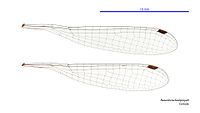Nososticta koolpinyah
Appearance
(Redirected from Koolpinyah threadtail)
| Nososticta koolpinyah | |
|---|---|

| |
| Male, Northern Territory | |
| Scientific classification | |
| Domain: | Eukaryota |
| Kingdom: | Animalia |
| Phylum: | Arthropoda |
| Class: | Insecta |
| Order: | Odonata |
| Suborder: | Zygoptera |
| Family: | Platycnemididae |
| Genus: | Nososticta |
| Species: | N. koolpinyah
|
| Binomial name | |
| Nososticta koolpinyah | |

| |
Nososticta koolpinyah is a species of Australian damselfly in the family Platycnemididae,[3] commonly known as a Koolpinyah threadtail.[4] It has only been found in the vicinity of Darwin and on Melville Island in Northern Territory, where it inhabits streams.[5]
Nososticta koolpinyah is a small, slender damselfly; males are coloured black with greenish blue markings and greenish brown tinted wings, females are black with yellowish markings and clear wings.[6]
Gallery
[edit]-
Female wings
-
Male wings
-
Female
See also
[edit]References
[edit]Wikimedia Commons has media related to Nososticta koolpinyah.
Wikispecies has information related to Nososticta koolpinyah.
- ^ Dow, R.A. (2019). "Nososticta koolpinyah". IUCN Red List of Threatened Species. 2019: e.T163556A87528227. doi:10.2305/IUCN.UK.2019-2.RLTS.T163556A87528227.en. Retrieved 18 November 2021.
- ^ Watson, J.A.L.; Theischinger, G. (1984). "The Australian Protoneurinae (Odonata)". Australian Journal of Zoology Supplementary Series. 32. 32 (98): 1–51 [16]. doi:10.1071/AJZS098.
- ^ "Species Nososticta koolpinyah Watson & Theischinger, 1984". Australian Faunal Directory. Australian Biological Resources Study. 2012. Retrieved 14 April 2017.
- ^ Theischinger, Günther; Hawking, John (2006). The Complete Field Guide to Dragonflies of Australia. Collingwood, Victoria, Australia: CSIRO Publishing. p. 64. ISBN 978-0-64309-073-6.
- ^ Theischinger, Gunther; Endersby, Ian (2009). Identification Guide to the Australian Odonata (PDF). Department of Environment, Climate Change and Water NSW. p. 228. ISBN 978-1-74232-475-3.
- ^ Watson, J.A.L.; Theischinger, G.; Abbey, H.M. (1991). The Australian Dragonflies: A Guide to the Identification, Distributions and Habitats of Australian Odonata. Melbourne: CSIRO. ISBN 0643051368.




